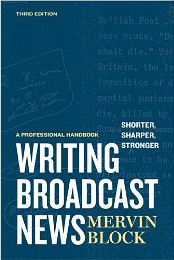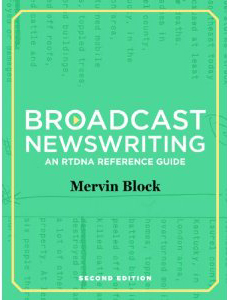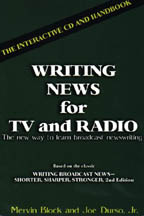Many newscasters apparently think that ing words (for example, hunting, fishing, shooting) convey action better than non-ings. But ing has no sting.
When it comes to using ing, no other network anchor measures up to David Muir, anchor of ABC’s “World News Tonight.” Muir relies heavily on participles that end in ing. But they’re not verbs, they’re adjectives. Verbs are the muscles that make sentences move. Many other anchors across the land also mistakenlyrely on participles instead of verbs. But Muir is probably the king of ing. Evidence? Plenty. Exhibit A: An excerpt from his newscast of April 7 (participles italicized courtesy M. Block). In a voiceover, Muir said:
“Donald Trump at a campaign stop saying it’s great to be home, and taking aim at Ted Cruz, joining some New Yorkers giving Cruz a hard time, blasting him after what he said about New York values, getting heckled but back out today trying to win over New Yorkers.” Seven ings in one non-sentence. When did those activities take place? Or have they all taken place? Ings hide that. (The ABC transcript says, just above the copyright: “Language: English.” English? No! Inglish. It’s also gibberish.)
Other ings are scattered throughout that transcript, including this from Muir on the same night: “The manhunt at this hour. Two psych patients charged in violent crimes escaping.” Huh? Sounds as though they might be escaping at that very moment, even as Muir was speaking. ABC News itself had posted news of the capture of one escapee at 1:23 p.m. ET that day. That was more than five hours before Muir said the two fugitives are or were (I can’t tell) escaping. Muir’s inging construction produces a pudding not worth a farthing. Yes, making any sense of it is a far thing.
Winston Churchill, a superb writer, used verbs to great effect. You can easily find one of his most famous addresses—no, not 10 Downing Street—called “We Shall Fight on the Beaches.” Britain’s wartime prime minister delivered it in the House of Commons on June 4, 1940. It’s available on the internet both as text and audio. Churchill sure wasn’t an ingster; his prose packs a punch.
Now some odds and ends.
Andy Fisher, a retired NBC News writer, told me of a few recent on-air bloopers he saw (and heard). They’re too good not to pass along. Andy said WCBS-TV, New York City, reported that a house fire in a suburb (May 29) was “set intentionally.” If a fire is set, it is intentional. Dandy Andy, sharp of eye, ear, and wit, often comes in handy. He said WABC-TV of New York City sent a reporter, Dray Clark, to Elmont, Long Island (May 26), to cover the apparent torching of three cars. “At least,” Andy said, “we think he was in Elmont; in his report, he twice identified the locale as Elkton.” Anchor Lori Stokes compounded the misdemeanor by saying, “Good report, Dray.” New York has no Elkton. And probably no elk.
Andy also told me that Muir reported (May 26), “A team of historians have been called in.” Correct: “has been called in.” He said Muir began his newscast on May 17, 2016, with a new report on the year-ago Amtrak derailment in Philadelphia that killed eight people: “Authorities,” Muir began, “now reveal what happened with the conductor on that Amtrak train.” But conductors don’t drive trains; engineers do. Later, in introducing a correspondent, Muir again used the word “conductor” wrongly. Finally, he used “engineer.”
Now to give two others networks equal time (more or less) Scott Pelley, who anchors the “CBS Evening News,” said (April 5), “Five people have been killed after a sight-seeing helicopter crashed in Tennessee.” Killed after the copter crashed? Not so. They were killed when it crashed.
Lester Holt, anchor of NBC’s “Nightly News,” described Prince (April 21) as “one of music’s most unique and dynamic performers….” Most unique? Unique is an absolute adjective. Unique means one of a kind, so nothing can be more unique than something else. Yet, on May 9, Paul Krugman, a Nobel Prize winner, wrote in his New York Times column of a political candidate, “But his ignorance isn’t as unique as it may seem.” Something is either unique or not unique; there are no degrees of uniqueness. (Krugman’s Nobel is in economics, not grammar.)
Chris Jones-Cruise of VOA (Voice of America), a careful listener and writer, told me about an AP story, later carried by some broadcasters, that told of a manhunt for a “wanted fugitive.” Chris says he has never heard of a fugitive who was unwanted.
True, nothing too exciting in this column, so don’t stop the presses—or stop the press passes.
Mervin Block is the author of Writing Broadcast News Shorter, Sharper, Stronger: A Professional Handbook.
© Mervin Block 2016
S A L E !The Merv Block bookshelf on broadcast newswriting. |
 SALE SALE  |
 SALE SALE  |
|
|
S A L E !“Writing Broadcast News” and “Broadcast Newswriting: The RTDNA Reference Guide” “Rewriting Network News” and “Writing News for TV and Radio” All four of Block’s books about newswriting: $121—a saving of $30. Buy direct from the publisher, CQ Press. Or email: customerservice@cqpress.com Or call toll-free: 866-427-7737. |